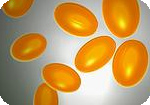| Wednesday, 14 May 2025 Home • About Us • Contact Us |
|
|
|
You are here:
A new Japanese study has found that natural compounds found in Vitamin E exert anti-cancer benefits when accumulated in cells.
Researchers found that tocotrienols, members of the Vitamin E family, delay tumor growth and promote the death of tumors, when built up in cells. They evaluated the anti-tumor activities of both gamma and delta tocotrienols in mouse cancer cells, and found that supplementing the diet of the mouse with both forms of tocotrienols significantly delayed tumor growth. The researchers also found that delta tocotrienols, when studied outside the living organism (in vitro), were particularly effective in delaying tumor growth through the induction of apoptosis (programmed cell death). The potential anti-cancer benefits of tocotrienols are not new, but the Japanese researchers claim that their study is the first to show accumulation of the compounds in cancer cells:
Tocotrienols are part of eight natural compounds in the Vitamin E family. There are four tocopherols, known as alpha, beta, gamma and delta and four tocotrienols; alpha, beta, gamma and delta. Whilst alpha tocopherol has become the main form of Vitamin E used in food/dietary supplements, more recent research has shown that in fact the other tocopherols and the tocotrienols have very important and unique antioxidant activity. Vitamin E is a fat-soluble vitamin, so it is stored in the body mainly in fat tissue. Alpha-tocopherol is the only form of Vitamin E that is actively maintained in the body, so it is therefore the form of Vitamin E found in the largest quantities in the blood and tissue. Vitamin E is an antioxidant, and protects the body against oxidative damage caused by free radicals, as well as preventing the breakdown of body tissues. Good food sources of Vitamin E include oils like vegetable, corn, sunflower, sesame, wheat germ and palm oils, as well as nuts. Tocotrienols are found in palm oil, cereal grains, hazelnuts and rice bran.
Link to this article: Show: HTML Link • Full Link • Short Link
Related Articles:
You must be registered and logged in to comment. |
|
 |
 | |
|
|

 "These results, to our knowledge, are the first demonstration of specific accumulation of gamma-tocotrienol and delta-tocotrienol in tumours and suggest that tocotrienols accumulation is critical for the anti-tumour activities of tocotrienols."
"These results, to our knowledge, are the first demonstration of specific accumulation of gamma-tocotrienol and delta-tocotrienol in tumours and suggest that tocotrienols accumulation is critical for the anti-tumour activities of tocotrienols." 






